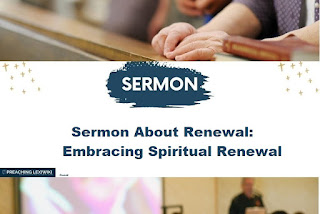Embracing Spiritual Renewal: A Journey to Transformation
A topic that lies at the very core of our faith journey: spiritual renewal. The concept of renewal is woven throughout the Scriptures, revealing God's desire to transform us from the inside out. As we delve into these passages, we will uncover the transformative power of renewal and how it impacts every aspect of our lives.
It simply will not do to equate spiritual renewal with the performing of external good works. Anydefinition of true renewal that focuses primarily on what we can observe, measure or, control in visible lifestyleis inadequate. Spiritual renewal denotes first and foremost a change of heart and mind, emotion and attitude,brought about by the Holy Spirit.
-------- Ads --
I. Renewal Means Being a New Creation (2 Corinthians 5:17)
Our exploration begins with the truth that renewal is synonymous with becoming a new creation. 2 Corinthians 5:17 declares, "Therefore, if anyone is in Christ, he is a new creation; old things have passed away; behold, all things have become new." Through Christ, we experience a spiritual rebirth, leaving behind our old selves and embracing a new identity in Him. This renewal changes not only our behavior but the very core of our being.
II. Renewal Means Renewing of Your Mind (Romans 12:2)
The second aspect of spiritual renewal focuses on the transformation of our minds. Romans 12:2 instructs, "Do not be conformed to this world, but be transformed by the renewing of your mind, that you may prove what is that good and acceptable and perfect will of God." As we allow God to renew our minds, our thought patterns, perspectives, and values align with His will. This renewal guides our choices and actions.
III. Renewal Means Renewing Their Strength (Isaiah 40:31)
Isaiah 40:31 assures us, "But those who wait on the Lord shall renew their strength; they shall mount up with wings like eagles, they shall run and not be weary, they shall walk and not faint." Spiritual renewal invigorates our souls and empowers us to navigate life's challenges. By placing our trust in God, we find renewed strength to face trials and journey with unwavering perseverance.
IV. Renewal Means a New Heart and New Spirit (Ezekiel 36:26-27)
Ezekiel 36:26-27 offers a vivid image of spiritual renewal: "I will give you a new heart and put a new spirit within you; I will take the heart of stone out of your flesh and give you a heart of flesh. I will put My Spirit within you and cause you to walk in My statutes, and you will keep My judgments and do them." This renewal involves a transformation from within, as God replaces our hardness of heart with sensitivity to His leading.
V. Renewal Means a Pure Heart (Psalm 51:10)
Psalm 51:10 poignantly expresses the plea for renewal: "Create in me a clean heart, O God, and renew a steadfast spirit within me." A pure heart is one free from sin and aligned with God's holiness. Spiritual renewal cleanses and purifies our hearts, making us vessels fit for God's purposes and enabling us to experience deeper intimacy with Him.
Read more
Conclusion:
Let us remember that spiritual renewal is not a one-time event but a continual process in the life of a believer. It encompasses being transformed into a new creation, renewing our minds, receiving new strength, experiencing a change of heart and spirit, and attaining purity of heart. Spiritual renewal transforms us into vessels through which God's glory shines.
May we embrace this journey of renewal with open hearts, inviting God's transformative work in every area of our lives. Let us surrender to His shaping hands, allowing Him to mold us into instruments of His grace, love, and purpose. As we experience spiritual renewal, may our lives become a testimony to the power of God's transformative love.

